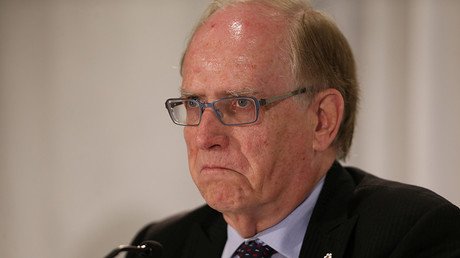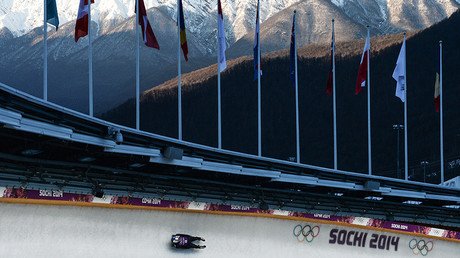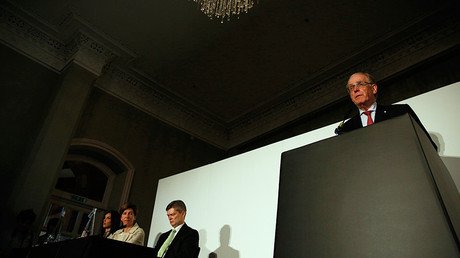No state doping program in Russia, zero tolerance on violations – Sports Ministry
The Russian Sports Ministry says it will thoroughly examine the information presented in the latest McLaren report on alleged doping by Russian athletes, and is eager to cooperate with international anti-doping bodies.
The Sports Ministry denied McLaren’s allegations that Russian athletes concealed positive doping tests and that there was a state-sponsored doping system operating in Russia, a statement published on the ministry’s website said.
“Russia’s Sports Ministry says with all responsibility that there is no state-run program promoting doping in sport,” the ministry said in the statement, adding that it pledges to “fight doping with a zero-tolerance policy.”
Russia’s Sports Minister Pavel Kolobkov believes Richard McLaren used “the wrong terms” when speaking of Russia's doping scheme allegedly sponsored by the government.
“McLaren said 'a state-run scheme'. This is the wrong term. There have been no schemes at all,” Kolobkov said, according to his press-service.
Russia’s law enforcement agencies are investigating certain violations, I would say, even crimes, carried out in particular by Rodchenkov and his possible accomplices,” Kolobkov said referring to former head of Moscow anti-doping lab Grigory Rodchenkov who allegedly ran a massive doping ring, destroyed thousands of Russian athletes' doping control samples and was the single named source in the McLaren report
“It would be great if they [the WADA] probed into doping violations in other countries as vigorously [as they do in Russia],” the minister said. “On the other hand, it’s good to hear that McLaren took notice of our initiatives aimed at cleaning Russian sport of doping. I must say, we are doing this not under their pressure, but because we are interested in clean sport more than others,” Kolobkov said.
Measures have already been introduced to combat doping in compliance with the UNESCO International Convention against Doping in Sport and Council of Europe’s Anti-Doping Convention, the statement adds.
The IOC has issued a statement following McLaren’s report, promising to re-analyze urine samples taken from Russian athletes at the 2014 Sochi Winter Olympics, while confirming that re-analyzed blood samples from the Games were found to be clean.
The Sports Ministry is calling for an investigation into the McLaren report.
“Russia’s relevant authorities are investigating all of the circumstances listed in the first part of McLaren’s report, and the Sports Ministry will advise those authorities to carry out a similarly thorough investigation of what has been said in the second part,” the ministry statement reads.
The latest part of the McLaren report is “outdated” as after the first section came out, Russian legislation was changed to grant independence to the Russian Anti-Doping Agency (RUSADA), said the head of Russia’s Independent Public Anti-Doping Commission, Vitaly Smirnov.
“Personally, I am convinced there is no system of manipulations and violations organized or supported by the government, and there cannot be one. It goes against everything that is being done [in Russia]," Smirnov told journalists.
“Athletes should simply keep on getting ready for PyeongChang [2018 Winter Games] along with their coaches, following their comprehensive, target-oriented programs,” the ROC’s first vice-president, Stanislav Pozdnyakov, told R-Sport news agency in a telephone interview.
“We haven’t actually heard anything new and shouldn’t lose our temper, [we should] systematically fight against doping in our country. I see it as the only way to deal with the problem,” Pozdnyakov said, adding that if Russia manages to create a “transparent” system, there will be no reports such as the one by McLaren.
Russia will no longer accept accusations without evidence, said Yelena Isinbayeva, who is an Olympic pole vault champion and also chief of the RUSADA observing board.
The Russian anti-doping body will demand that WADA provides proof of doping abuses and lists the names of the alleged perpetrators, Isinbayeva added.
“From now on we will not tolerate their allegations starting with ‘All of you’ and ‘You have a state-backed program.’ All that is in the past. The current task is to regain credibility and to make all WADA officials certain that we don't stay idle but do our utmost for the sake of restoring our agency,” Isinbayeva said, according to TASS.
If what the McLaren report alleges is true, it raises questions over the International Olympic Committee's competence, anti-doping litigation lawyer Gregory Ioannidis believes.
“We need to actually understand that if we make references to the specific Olympic Games which are mentioned in the report, we have to ask the question: who has the responsibility for the organization of the Games? And the answer is simple: the International Olympic Committee. So my question is: why has the situation gone on undetected for such a long time?”
Legendary USSR and Russian hockey player, MP and activist, Vyacheslav Fetisov, suggested that doping control samples from all athletes who took part in the Olympic Games in London, Rio and Sochi should be re-tested in the wake of the McLaren report, to “see how grave the whole situation is.”
German extreme swimmer Marco Henrichs, who is also a runner and coach, believes that the scrutiny of the Russian Olympic team has nothing to do with so-called “fair play,” and was initiated for another reason.
“There is no doubt that doping naturally exists in other countries and in Germany as well. I think that these intensive probes into Russian sport are partially used to create a negative impression of Russians,” Henrichs told RT.















